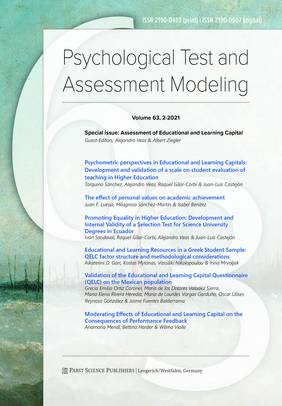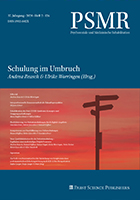Psychometric perspectives in Educational and Learning Capitals: Development and validation of a scale on student evaluation of teaching in Higher Education
Tarquino Sánchez, Alejandro Veas, Raquel Gilar-Corbí & Juan-Luis Castejón
PDF of the full article
The effect of personal values on academic achievement
Juan F. Luesia, Milagrosa Sánchez-Martín & Isabel Benítez
PDF of the full article
Promoting Equality in Higher Education: Development and Internal Validity of a Selection Test for Science University Degrees in Ecuador
Iván Sandoval, Raquel Gilar-Corbí, Alejandro Veas & Juan-Luis Castejón
PDF of the full article
Educational and Learning Resources in a Greek Student Sample: QELC factor structure and methodological considerations
Aikaterini D. Gari, Kostas Mylonas, Vassiliki Nikolopoulou & Irina Mrvoljak
PDF of the full article
Validation of the Educational and Learning Capital Questionnaire (QELC) on the Mexican population
Grecia Emilia Ortiz Coronel, María de los Dolores Valadez Sierra, María Elena Rivera Heredia, María de Lourdes Vargas Garduño, Óscar Ulises Reynoso González & Jaime Fuentes Balderrama
PDF of the full article
Moderating Effects of Educational and Learning Capital on the Consequences of Performance Feedback
Anamaria Mendl, Bettina Harder & Wilma Vialle
PDF of the full article
Psychometric perspectives in Educational and Learning Capitals: Development and validation of a scale on student evaluation of teaching in Higher Education
Abstract:
Student evaluation of teaching is an important topic in the field of education, and different rating scales have been developed in international contexts. However, there have been methodological problems that may lead to ineffective construct measurement. The aim of this study Considering as an extension of the Actiotope Model of Giftedness, the aim of this study was to support an internal structure of a new 32 item instrument in a large public university in Ecuador, using a sample of 6110 students. Data were analysed based on the item response theory, including unidimensional and multidimensional Rasch rating scale models to examine three theory-based constructs. Preference was given to a more precise multidimensional construct with four interrelated domains.
Keywords:
student evaluation of teaching, scale validation, higher education, item response theory
Corresponding author:
Alejandro Veas, PhD
University of Alicante.
Department of Developmental Psychology
and Didactics
PO 03690
San Vicente del Raspeig, Alicante, Spain
E-mail: Alejandro.veas@ua.es
The effect of personal values on academic achievement
Abstract:
Numerous studies have demonstrated the importance of individual and contextual variables in explaining academic performance. Among the individual variables, personal characteristics such as sociodemographic variables have been investigated. Regarding the contextual variables, the influences of parental and school styles have been studied. However, personal values could also contribute to understanding students’ achievement. The present study aims to analyse the relationship between personal values and academic performance. To do so, we first adapted two scales that aimed to measure the meaning of life and intellectual humility by following a committee approach. The Spanish version was administered to 54 students to evaluate the psychometric properties of the scales. The results and information provided by the experts were used to create revised versions of the scales, which were administered to 154 students together with other instruments focused on evaluating academic performance. The correlations between personal values and academic performance were computed, and the academic performance of students with different scores in personal values was compared. Intellectual humility was related to cognitive skills, and differences were identified in the academic performance between participants with high and medium scores in personal values. The implications and the utility of the adapted versions of the instruments are discussed.
Keywords:
personal values, academic performance, meaning of life, intellectual humility
Corresponding author:
Isabel Benítez, PhD
Faculty of Psychology.
Campus de Cartuja s/n. 18071.
Granada (Spain)
Phone: +34 958246234
E-mail: ibenitez@ugr.es
Promoting Equality in Higher Education: Development and Internal Validity of a Selection Test for Science University Degrees in Ecuador
Abstract:
The use of tests or examinations for student admission is an extended strategy in most higher education institutions. However, tests in Latin-American countries have not received attention regarding the validity and interpretation of these measures. As such, the aim of this study is to analyse the psychometric properties of a new university entrance examination test in Ecuador in a community sample of 1238 university students (28.10 % female). A two-parameter multidimensional item response theory (MIRT) model was used to calibrate item difficulty and discrimination parameters as well as differential item functioning (DIF) by gender. The final instrument was composed by 71 items, which was considered appropriate to ensure the measurement precision of all levels of students’ achievements.
Keywords:
University selection test, polytechnic school, Test Validation, multidimensional item response theory
Corresponding author:
Alejandro Veas, PhD
University of Alicante
Department of Developmental Psychology
and Didactics
PO 03690, San Vicente del Raspeig
Alicante, Spain
E-mail: Alejandro.veas@ua.es
Educational and Learning Resources in a Greek Student Sample: QELC factor structure and methodological considerations
Abstract:
This research, inspired by the Actiotope Model of Giftedness as a holistic approach to gifted students’ potential, aims to address theoretical, methodological, and structural aspects of the Questionnaire of Educational and Learning Capital (QELC) in a Greek sample of children and young teenagers (10- to 14-year-olds). QELC (Ziegler & Baker, 2013) was administered in classrooms, assessing the students’ educational and learning resources as two forms of capital, the educational one (5 subscales) and the learning capital (5 subscales) as self-reported by students. The total sample consisted of 740 students, from 16 Greek primary and secondary public schools in Athens, other cities and some non-urban areas of Greece. Cronbach’s α indices for the Educational capital and Learning capital subscales were satisfactory ranging from .74 to
.85. Confirmatory Factor Analysis, through 1st and 2nd order models, confirmed the theoretical structure of 10 distinct subscales and also supported to a satisfactory extent two higher-order factors. Statistically significant differences were observed for the educational didactic scale and the attentional learning scale by place of residence, and by the two age-bands of students (10- to 11- and 12- to 14-year-olds). The results are discussed on the basis of the QELC verified factor structure and its theoretical implications, along with its cross-cultural perspective.
Keywords:
educational and learning capital, Actiotope Model of Giftedness, first and second-order factor-
structure, cross-cultural perspective, the "appropriate coefficients" question
Corresponding author:
Aikaterini D. Gari, PhD
Department of Psychology
National and Kapodistrian University of
Athens
E-mail: agari@psych.uoa.gr
Validation of the Educational and Learning Capital Questionnaire (QELC) on the Mexican population
Abstract:
The Actiotope Model of giftedness is a systemic model with a focus on actions directed towards objectives of ability development. As such, the development of talents and extraordinary achievements is considered an intelligent adaptation to environmental and personal stimuli. The Questionnaire of Educational and Learning Capital (QELC) may allow for empirical evidence of successful adaptation of an actiotope. Thus, the purpose of this study was to examine the psychometric properties of The Questionnaire of Educational and Learning Capital in the Mexican population. A total of 374 gifted Mexican elementary school students participated (X̅=11.18 age, S.D. 1.36). We calculated its internal consistency and performed confirmatory factor analysis. The results show that the original factor structure presents absolute fit, and low
levels of error. Additionally, we observed adequate values of extracted variance (0.5
Keywords:
high capacities, student body, QELC, validity, CFA
Corresponding author:
María de los Dolores Valadez Sierra, PhD
University of Guadalajara
Sierra Mojada 950
Guadalajara, México
E-mail: dolores.valadez@academicos.udg.mx
Moderating Effects of Educational and Learning Capital on the Consequences of Performance Feedback
Abstract:
Feedback is highly recommended in educational settings and can deliver valuable information to guide one’s learning efforts. However, it can—but does not need to—lead to detrimental effects on learners’ motivation and emotions. The response should be moderated by the individual’s attitudes, experiences, abilities and many other aspects which can be subsumed in the concept of educational and learning capital. This study investigated the effects of random feedback on a reasoning test, measuring the participants’ subsequent cognitive, metacognitive, motivational and emotional responses. Initially, we assessed their educational and learning capital to analyze direct and moderating effects on the responses. Results showed that feedback effects were not as strong as expected while educational and learning capital exerted strong direct effects. Moderating effects were verified for only some responses.
Keywords:
Educational and learning capital, feedback, performance, motivation, emotion
Corresponding author:
Anamaria Mendl, PhD
Department of Educational Psychology and
Research on Excellence
University of Erlangen-Nuremberg
Regensburger Straße 160
90478 Nuremberg, Germany
E-mail: anamaria.mendl@fau.de
Psychological Test and Assessment Modeling
Volume 63 · 2021 · Issue 2
Pabst, 2021
ISSN 2190-0493 (Print)
ISSN 2190-0507 (Internet)























